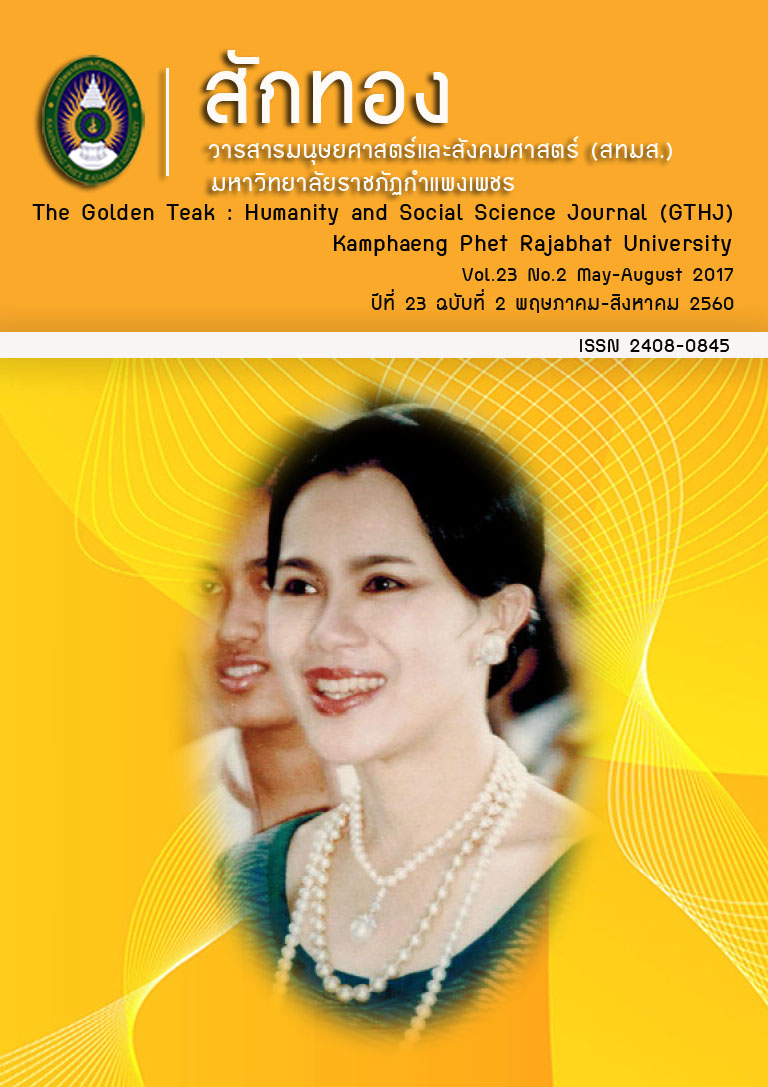การพัฒนากลยุทธ์การบริหารการประหยัดพลังงานไฟฟ้าภายในสถานศึกษาสังกัด สถาบันการอาชีวศึกษาภาคเหนือ 4
Main Article Content
Abstract
บทคัดย่อ
การวิจัยครั้งนี้มีจุดประสงค์เพื่อ 1. ศึกษาสภาพ ปัญหา และปัจจัยที่เกี่ยวข้องกับการบริหารการประหยัดพลังงานไฟฟ้าภายในสถานศึกษาสังกัดสถาบันการอาชีวศึกษาภาคเหนือ 4 2. พัฒนากลยุทธ์การบริหารการประหยัดพลังงานไฟฟ้าภายในสถานศึกษาสังกัดสถาบันการอาชีวศึกษาภาคเหนือ 4 และ 3. ทดลองและประเมินกลยุทธ์การบริหารการประหยัดพลังงานไฟฟ้าภายในสถานศึกษาสังกัดสถาบันการอาชีวศึกษาภาคเหนือ 4 เก็บรวบรวมข้อมูลโดยใช้แบบสอบถาม การสัมภาษณ์ การวิเคราะห์เอกสาร การประชุมเชิงปฏิบัติการ การสัมมนาอิงผู้เชี่ยวชาญ การทดลองใช้กลยุทธ์ และการประเมินกลยุทธ์ และวิเคราะห์ข้อมูลโดยใช้ค่าความถี่ ค่าร้อยละ ค่าเฉลี่ย ค่าความเบี่ยงเบนมาตรฐาน และการวิเคราะห์เนื้อหา ผลการวิจัยพบว่า (1) สภาพการบริหารการประหยัดพลังงานไฟฟ้า พบว่า แต่ละสถานศึกษามีโครงการประหยัดพลังงานไฟฟ้า ส่วนปัญหา พบว่า ไม่มีแผนกลยุทธ์สำหรับใช้ในการบริหารการประหยัดพลังงานไฟฟ้า และปัจจัยที่เกี่ยวข้อง พบว่า ด้านจุดแข็ง บุคลากรมีสมรรถนะหลากหลายสาขาวิชาชีพ ด้านจุดอ่อน อุปกรณ์ไฟฟ้าส่วนใหญ่มีประสิทธิภาพการทำงานต่ำ ด้านโอกาส นโยบายและการเมืองเอื้อให้ดำเนินการ และด้านอุปสรรค สภาพอากาศร้อนขึ้นทำให้ใช้พลังงานไฟฟ้าเพิ่มขึ้น (2) กลยุทธ์การบริหารการประหยัดพลังงานไฟฟ้าภายในสถานศึกษาสังกัดสถาบันการอาชีวศึกษาภาคเหนือ 4 ประกอบด้วย 1 วิสัยทัศน์ 4 พันธกิจ 1 ค่านิยม 4 ประเด็นกลยุทธ์ 16 เป้าประสงค์ 18 กลยุทธ์ 18 ตัวชี้วัด และ 19 มาตรการ และ (3) จากการนำกลยุทธ์ไปทดลองใช้ พบว่า ได้ 9 ผลผลิต 9 ผลลัพธ์ และผลการประเมินคุณภาพของกลยุทธ์ด้านความสอดคล้อง ความเหมาะสม ความเป็นประโยชน์ และความเป็นไปได้ พบว่า อยู่ในระดับมาก และมากที่สุด
Strategy Development for Electrical Power Saving Administration in Vocational Institutes under the Institute of Vocational Education Northern Region 4
ABSTRACT
The purposes of this research were 1. to study the states, problems and factors related to electrical power saving administration in vocational institutes under the Institute of Vocational Education Northern Region 4, 2. to develop the administrative strategies for electrical power saving administration in vocational institutes under the Institute of Vocational Education Northern Region 4, and 3. to experiment and evaluate the strategies. 4. The data were collected through a questionnaire, an interview, documentary analysis, workshops, a connoisseurship, strategic experiment and assessment. Basic statistics including mean, frequency, percentage, standard deviation, and content analysis were also used. The findings were as follows: (1) The administration of electrical power saving measures revealed that each vocational institute had electrical power saving projects. The problem was that there was no strategic plans to use for electrical power saving administration. For the factors related to electrical power saving administration, the strength was found that personnel had a wide range of competencies, and the weakness was that most electrical equipment had low efficiency. The opportunity was found that the policy contributed to electrical power saving administration, and the threat was found that the weather heats up causing increased power consumption. (2) The strategies consisted of 1 vision, 4 missions, 1 value, 4 strategic issues, 16 goals, 18 strategies, 18 indicators, and 19 measures. (3) The strategic experiment found that there were 9 products and 9 outcomes. The quality of the strategies in terms of consistency, propriety, utility and feasibility was found at a high and the highest level.
Article Details
บทความที่ได้รับการตีพิมพ์เป็นลิขสิทธิ์ของวารสาร สักทอง : วารสารมนุษยศาสตร์และสังคมศาสตร์ สถาบันวิจัยและพัฒนา มหาวิทยาลับราชภัฏกำแพงเพชร
ข้อคิดเห็นใดๆ ที่ปรากฎในวารสารเป็นวรรณกรรมของผู้เขียนโดยเฉพาะ ซึ่งมหาวิทยาลัยราชภัฏกำแพงเพชรและบรรณาธิการไม่จำเป็นต้องเห็นด้วย


